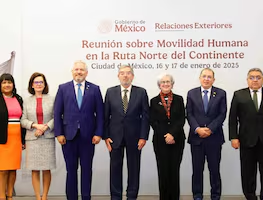Más Información

ONGs piden a Sheinbaum contemplar propuestas para seguridad vial; más de 16 mil personas mueren por accidentes

De la Fuente se reúne con representantes de 9 países de América Latina; coordinan acciones de migración

Mexicanos en EU entregan a SRE propuestas para defensa de los migrantes; destacan derechos de las mujeres

Colosio critica comités de evaluación de elección judicial; oficialismo escogerá a sus candidatos, acusa
A blast of Arctic air from the polar vortex brought dangerous , bone-chilling cold to a wide swath of the United States on Tuesday, stretching from the Dakotas through Maine , with snow expected as far south as Alabama and Georgia .
The Midwest was the hardest-hit region , as temperatures plunged below zero Fahrenheit ( -18°C ). By nightfall the mercury was hovering at 0°F in Chicago , 7°F ( minus 14°C ) in Detroit, and -21°F (- 29°C ) in Minneapolis .
The brutal blast known as the polar vortex is a stream of cold air that spins around the stratosphere over the North Pole , but whose current has been disrupted and is now pushing south into the United States.
Officials warned Chicago residents, accustomed to chilling winters, to expect an unusually deep and dangerous freeze .
“This could possibly be history-making,” said Ricky Castro , a National Weather Service meteorologist in Romeoville , Illinois .
As much as two feet ( 60 cm ) of snow was forecast in Wisconsin and six inches ( 15 cm ) in Illinois . Snow was expected through Wednesday from the Great Lakes region into New England .
Many Midwest cities opened warming shelters . Regional governments closed hundreds of schools and airlines canceled more than 2,000 flights , according to the FlightAware flight-tracking website. Many had been destined for Atlanta , where the National Football League’s Super Bowl will take place on Sunday.
Amy Patterson
, a vice president at the Atlanta Super Bowl Host Committee , said there would still be time for fans to fly to Atlanta for the game, with the National Weather Service forecasting a high of a balmy 58°F (14°C) on Sunday.
A low of -10°F ( -23°C ) was forecast in Chicago and elsewhere in northern Illinois on Wednesday. But with the wind chill factored in, temperatures will feel as low as -50°F ( -46°C ) through Thursday, the National Weather Service reported.
Temperatures could reach lows of -30°F to -40°F ( -34°C to -40°C ) in parts of the Northern Plains and Great Lakes on Wednesday, the NWS said.
The freezing weather may have killed a man in Rochester , Minnesota , who was found dead outside his home on Sunday, according to a report by WCCO , a local CBS affiliate . Rochester police officials did not respond to a request for comment.
Jim Hayes
, a National Weather Service meteorologist , warned that frostbite was possible within 10 minutes in the intense cold.
According to the National Weather Service , the coldest recorded temperature in Chicago was minus 27 degrees ( -33°C ) on January 20, 1985 .
sg







